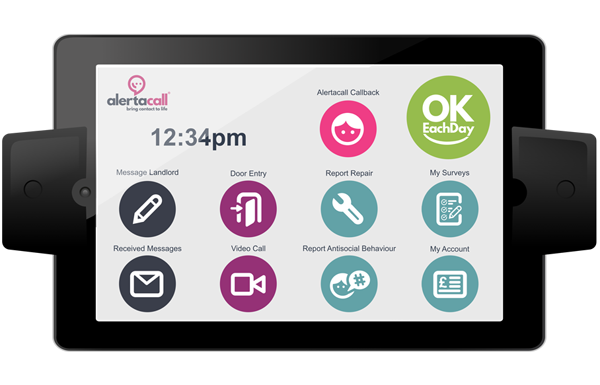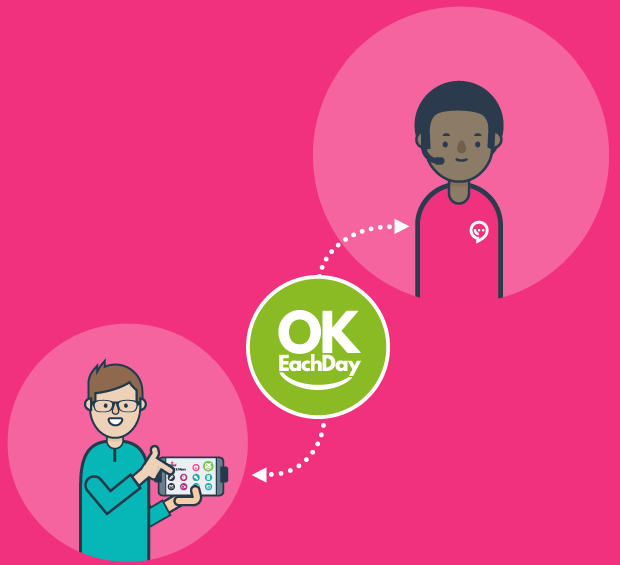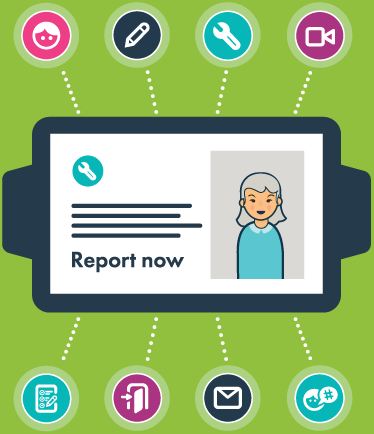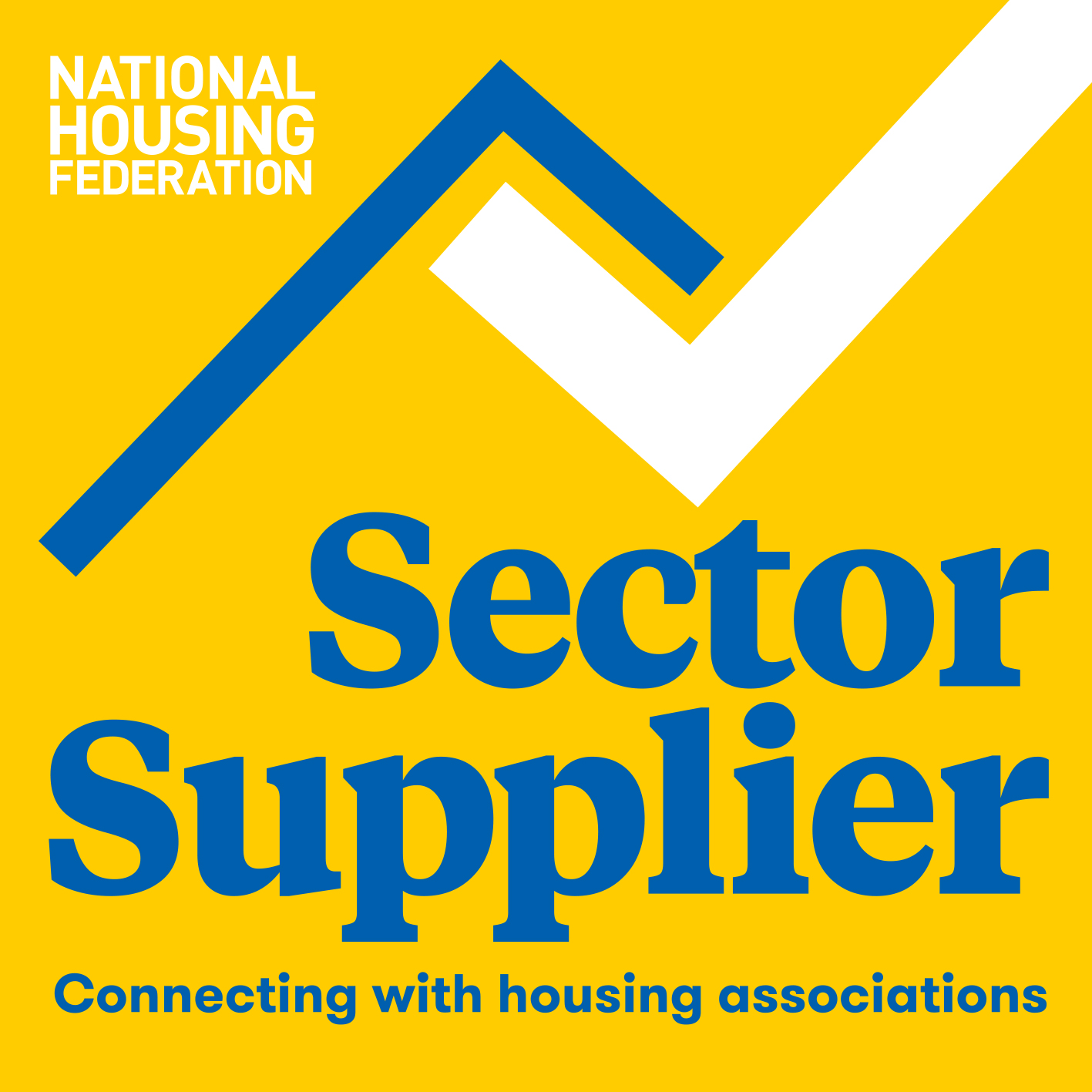Housing Proactive®
- Transform engagement
- Grow self-service
- Improve resident safety
- Offer human contact
Designed to help housing providers manage accommodation for older and higher needs people our portable touchscreen combines two-way digital engagement and self-service. Our optional OKEachDay® for Housing service can help you confirm occupancy, exchange information and offer high-quality human contact from a housing trained team 365 days a year.

Benefits
- Improve tenant satisfaction
- Empower and focus housing teams
- Substantially grow self-service activity
- Drive efficiency in your service model
- Increase feelings of safety and security
- Detect changing customer needs
- Avoid undiscovered tenant deaths
Benefits
Customers can contact you easily
by writing a message or recording one using their voice. This can be sent to a housing officer, help desk or both.
See live video of visitors
and talk to them before allowing them access from the comfort of a chair. Safer and easier for customers – who can also see any missed callers.
(Compatible IP door entry required)
Our team is available 365 days a year
to allow customers to notify us that they are going away, to relay housing-related info or to change settings.
Reporting repairs is now easy
because we give the option of a call with your repairs team or take the customer through multiple choice questions with intuitive icons to select.
Connect customers using video calls
which they can make to each other, and set their own approved caller list. Your team can also call customers from their own smartphone or computer.
(This is an additional cost option)
Reporting ASB is now easy
because we give the option of a call with your team members or take the customer through multiple choice questions with intuitive icons to select.
(Available summer 2023)
Keep customers informed
with text and picture messages which you can send to individuals, groups or areas you define. These can also be made to ‘popup’ when the OKEachDay button is pressed.
Check rent, pay bills and self-service
by integrating your own self-service portal or app on to our touchscreen, instantly boosting your digital engagement aspirations.
Listen and learn about your customer’s needs
by broadcasting surveys with multiple choice questions. Customers can be prompted to complete a survey after pressing the OKEachDay® button.
OKEachDay® for Housing (optional)
Customers are given the choice to engage with our ‘OKEachDay® button’ in their own time to confirm occupancy or otherwise receive a call from a person specially trained in housing related issues up to 365 days a year.
This powerful anchor of connection can be used to exchange housing-related information with customers, e.g. the status or repairs, and reduces risks by using follow-up processes to investigate unusual contact or absences.
As a free by-product of these exchanges, social isolation can also be markedly reduced. We also provide useful data about usage patterns through secure online reporting and the service can be adjusted in a number of ways to ensure it works for you and your customer in the best way.
Regularly confirm everything is OK at a property & give the choice of human contact.

If you would like to know more please contact us.
Who we help
- By Sector
- By Role
- General needs housing
Increased oversight of older and higher needs people who currently do not receive any additional support .
- Housing for older people
Enhanced housing management for those in supported accommodation to improve the effectiveness of housing teams .
- Housing for people with mental health conditions
A unique wellbeing check and reassurance call service, which also detects changing needs, delivered through digital engagement and a specially trained team.
- Housing for people with learning disabilities
Easy to use touchscreen, which increases contact and digital engagement with harder to reach individuals.
- Temporary & crisis accommodation
Discreet daily checks establish safety, improve tenant communication and help identify void properties.
- Hospital Discharge
Digital devices with regular ‘check ins’, medication and appointment prompts that improve patient outcomes and reduce readmission rates.
- Domiciliary care
A stepping stone service to in-home care, and a valuable complement to existing care provision providing additional reassurance checks.
- Senior leadership teams
Working across the organisation to design the most successful digital engagement initiatives which are future proofed, and work for all parts of the organisation – including tenants
- Housing teams
With a growing tenant base of older people and other higher needs groups, housing teams need increased oversight of tenants’ needs, at the same time as reducing their own workload.
- Asset teams
The forthcoming digital switchover requires an upgrade or alternative to hard wired systems. Our Beyond Warden Call system is easy to install, maintain, compliant, and is much more than a like-for-like replacement.
- Digital transformation and IT teams
Fully realising the benefits of self service transformation requires high adoption levels amongst even the hardest to reach groups. Find out how we overcome these challenges.
- Procurement and finance teams
Find out how we are not just a low cost option, but one with high levels of funding and demonstrable returns on investment.
- Hospital discharge
Increase the efficiency of the hospital discharge process, reduce Delayed Transfers of Care, and levels of readmission.
- Domiciliary care
Secure new clients with a low cost ‘stepping stone’ service into domiciliary care, or a hybrid solution with traditional home care visits, that helps meet clients’ budgets or helps with staff shortages.








